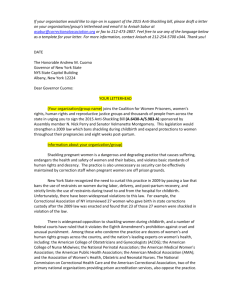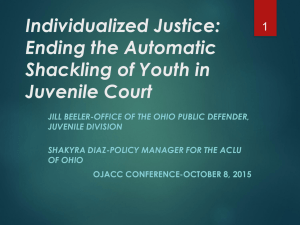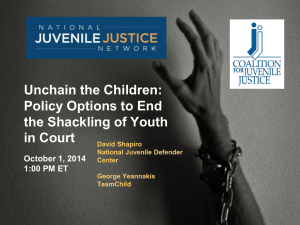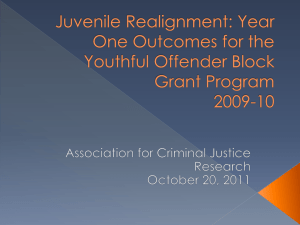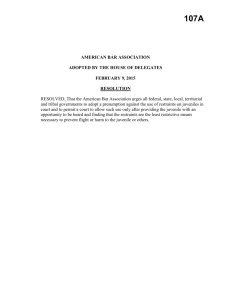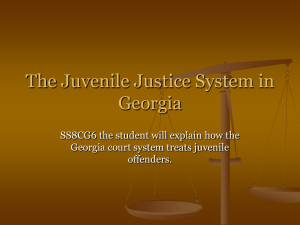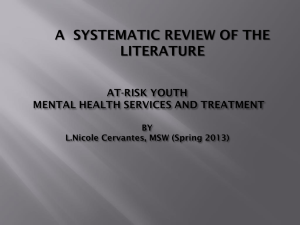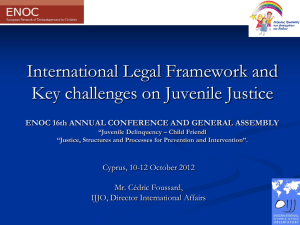Shackling PowerPoint - National Juvenile Defender Center
advertisement
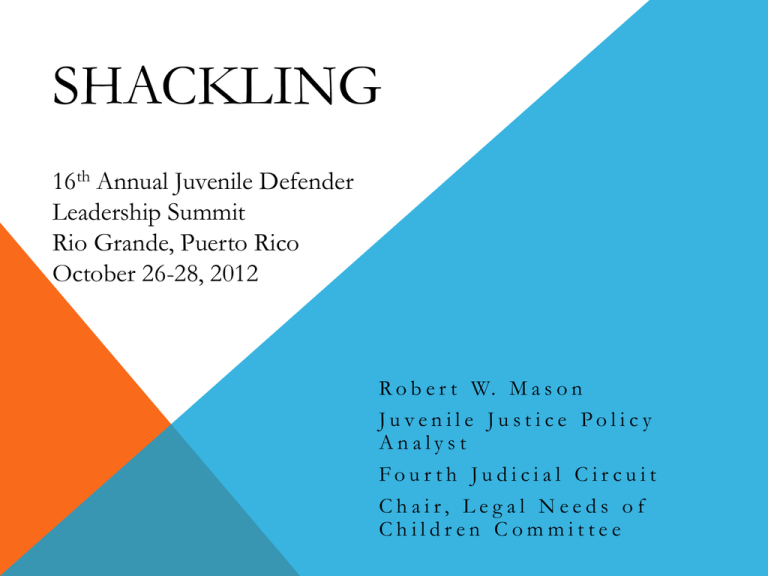
SHACKLING 16th Annual Juvenile Defender Leadership Summit Rio Grande, Puerto Rico October 26-28, 2012 R o b e r t W. M a s o n Juvenile Justice Policy Analyst Four th Judicial Circuit Chair, Legal Needs of Children Committee DECK V. MISSOURI • If a convicted double murderer is entitled to a rebuttable presumption that he will not appear shackled before the court- shouldn't a child with a nonviolent offense and no history of disruptive court room behavior be entitled to the same protection? DECK V. MISSOURI • The Rule does not ban or oppose shackling. Photo Credit: usatoday.com •The focus of the rule is on an individualized determination based on manifest need. VISUALIZATION: DETENTION HEARINGS • Orange jump suits • Feet shackled together (shuffle) • Hands shackled together • Shackled to belly chain •The oath: • The children cannot even get their right hand to their head level. Photo Credit: islandguardian.com 985.02 (1)(C) • Legislative intent for the Juvenile Justice System: To provide a safe and nurturing environment which will preserve a sense of personal dignity and integrity. JUVENILE JUSTICE KEY PRINCIPLES • Individualized assessment • Respect for the dignity of the child and the court • Goal=Rehabilitation • The Juvenile Justice System was created as a separate, distinct rehabilitative alternative to the more punitive, incapacitation-oriented Criminal Justice System. -J.M. (Fla. 2002) • Mechanistic approach to a matter that requires individual care and attention. JUVENILE JUSTICE - SPECIAL POPULATION 1. Abused 2. Mentally ill 3. Mentally challenged 4. Other disabilities All are limited by their childish thinking! NATIONAL MOVEMENT •22 states do not have a regular practice of shackling their youth. -Center for Children and Families UF (2008) •95% of unshackled children are compliant. -Alachua •Miami has not had problems. Photo Credit: usatoday.com Close vote committee, but… Board of Governors 30-0-0 Governor-elect Charlie Crist Shackling Permitted When… 1. Child is a danger to himself or others or 2. Founded belief that child is a flight risk ANCIENT RIGHT UNDER THE COMMON LAW •To be brought to the bar without irons, or any manner of shackles or bonds; unless there be evident danger of an escape. -Cited in Deck (1769) • The rule establishes a procedural framework for Juvenile court Judges to exercise their inherent discretionary authority over courtroom security and also provides flexibility for the court to balance safety and security needs with the individualized needs and rights of children. CONSTITUTIONAL RIGHT 1. To a fair hearing 2. Assistance of counsel INDISCRIMINATE SHACKLING Photo Credit: earlcarterlaw.com •No inquiry into the likelihood of misbehavior or escape •No regard to the youth’s age, size and alleged offense •Ironically, youths we have been direct filed are less likely to be shackled in the Criminal Justice System than in the Juvenile Justice System Shackling violates a child’s right to: 1.Due process 2.Presumption of innocence Photo Credit: juvenilejusticeblog.web.unc.edu •Shackling interferes with a child’s right to participate in defense of a case • Per Deck: Shackling tends to confuse and embarrass the accused’s mental faculties Joelgordon.photoshelter.com Shackling is… 1. Gratuitously punitive 2. Counter-therapeutic 3. Psychologically harmful DJJ/DCF SPECIFIC RULES • Restraints can be used: 1. Sparingly 2. When warranted by specific circumstances • It is generally accepted by medical and mental health professionals that shackling and physical restraints should only be used on children as a last resort. -American Psychiatric Association 3 MAIN SHACKLING JUSTIFICATIONS 1. Courtroom security (and lack of resources) 2. Lack of prejudice- no jury 3. Deterrent to future criminal conduct Shackling for Security… Like killing a bug with a hammer • You don’t have to change the courtroom. • You change the way you deal with the courtroom SHACKLING • • No evidence of deterrent effect Roper– deterrence does not work the same way for teens and adults PhotoCredit: joelgordon.photoshelter.com DECK VS. MISSOURI (NO SHACKLING PENALTY PHASE) • Inevitably implies to fact finder that the accused is dangerous • Can interfere with an accused’s ability to communicate with the lawyer • An affront to the dignity and decorum of Judicial proceedings ALLEN (ILL 2006) • Even when there is no jury, unnecessary restraint is impermissible. 1. Hinders the accused’s ability to assist counsel 2. Runs afoul of the presumption of innocence 3. Demeans both the accused and the proceedings “Our youth must never take a second position to institutional convenience and economy.” –FL Supreme Court (Video Detention Rule) Photo Credit: streetgangs.com “Personalized attention and plans are necessary to properly address the multiple and complex problems facing today’s children.” -FL Supreme Court Video Detention Hearings THERAPEUTIC JURISPRUDENCE • Promotes secure positive therapeutic outcomes and minimizes negative psychological and behavioral effects of anti-therapeutic legal rules and practices. DR. MARTY BEYER • Being chained may cause the child to feel dangerous • Undermines a child’s willingness to trust adults in positions of authority • Damages moral identity and development • Undermines the goal of rehabilitation DR. GWEN WURM Photocredit: mlive.com • Contrary to the basic tenants of developmental pediatric practice • “Contained beast”identity formation • Emotional/mental/p hysical harm INTERNATIONAL LAW 1. 2. • Obligation to treat all persons under detention with humanity and respect for their dignity Obligation to provide children who are detained with all measures of protection required by their status as juveniles US is a party to International Covenant on Civil and Political Rights UNIV. MIAMI CYLC 1. 2. 3. Procedural Blanket policy unconstitutional Due Process: • Individualized determination • No less restrictive alternative required 4. Contrary to rehabilitative alms of juvenile justice and anti-therapeutic “Neither the 14th Amendment nor the Bill of Rights is for adults alone.” -Gault
